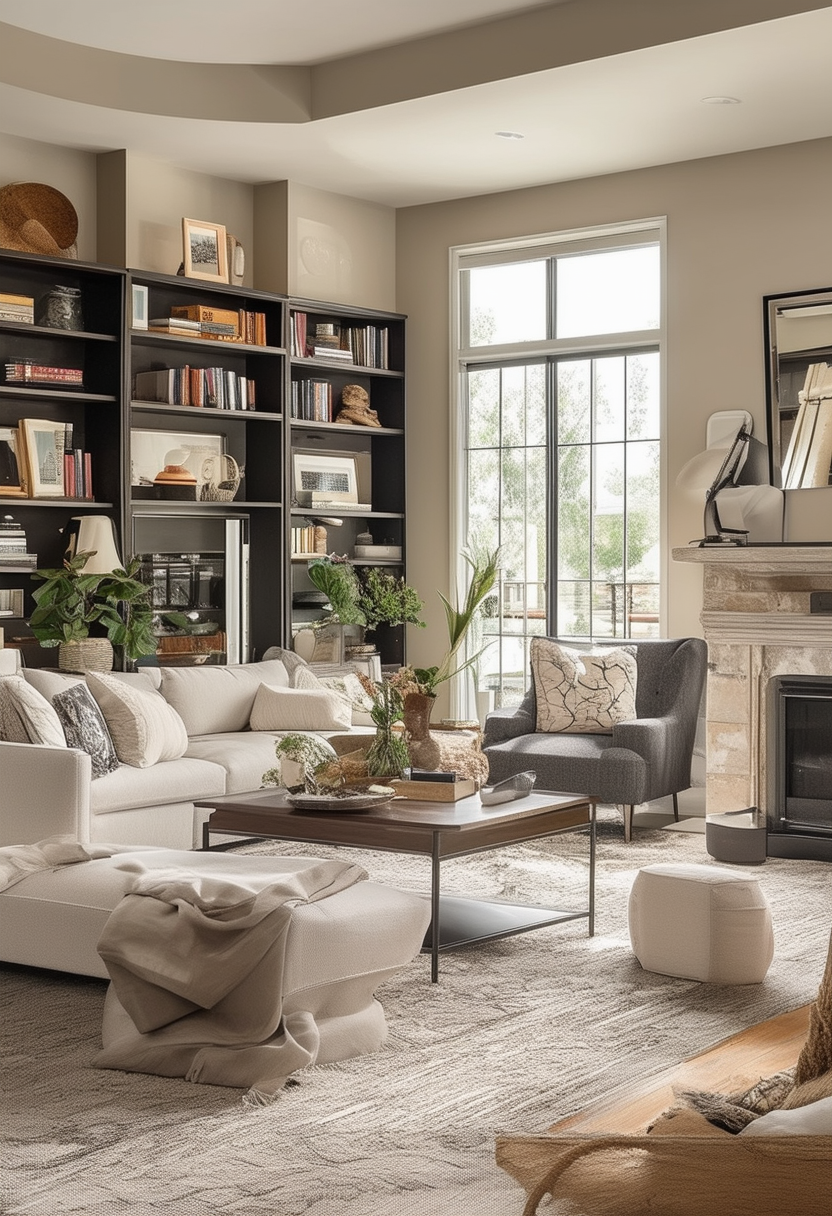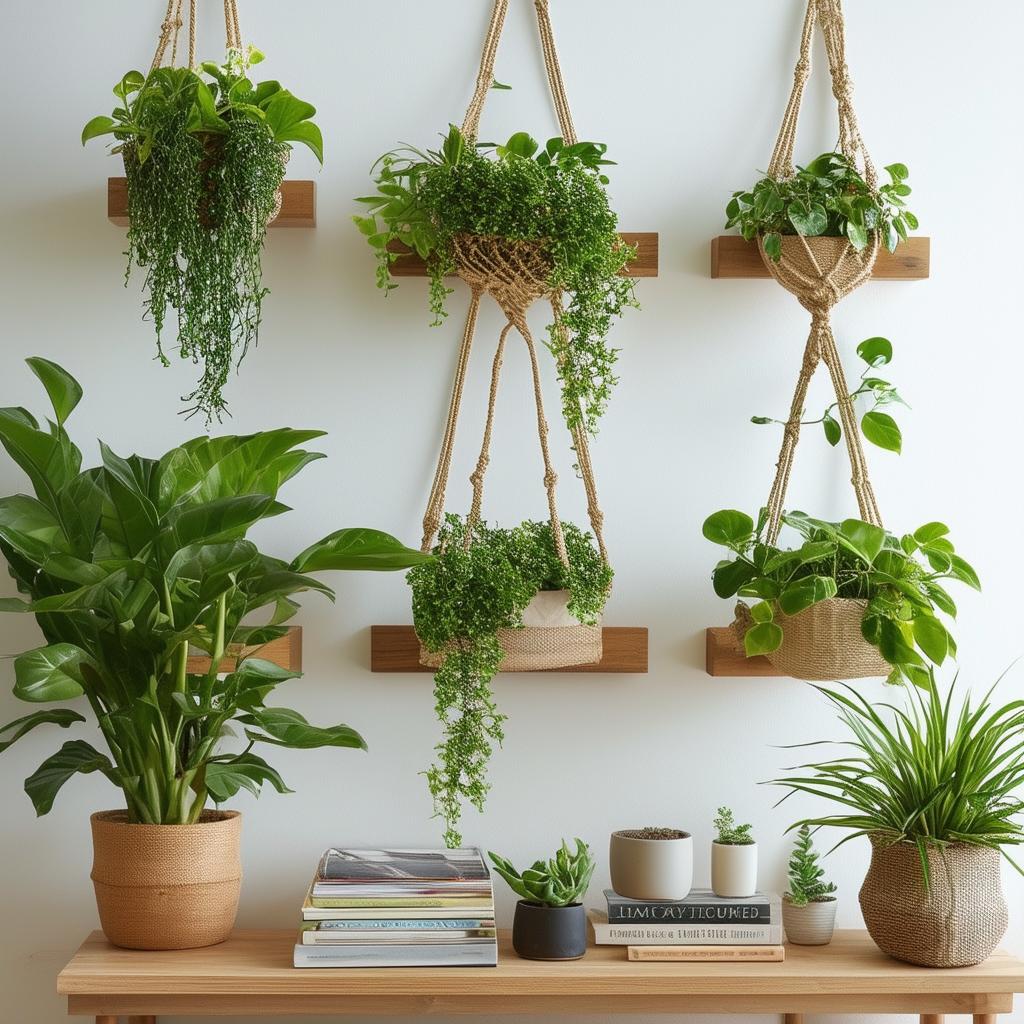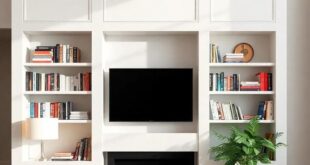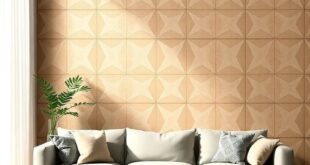When it comes to small living rooms, the challenge isn’t just about fitting furniture—it’s about creating a space that feels open, functional, and stylish. In these cozy areas, every square foot counts, making innovative space-saving solutions essential. Whether you’re dealing with a studio apartment or a compact family room, clever design strategies can help you optimize your space without compromising on comfort or aesthetics. In this article, we’ll delve into creative approaches and practical tips for transforming tiny living rooms into elegant, multifunctional spaces, ensuring you make the most of every inch while reflecting your personal style.
Maximize Style in Your Living Room with Smart Furniture Choices

Creating an inviting living room in a small space requires innovative furniture solutions that blend functionality with aesthetics. One of the best strategies is to opt for multi-purpose pieces that serve dual roles, such as a coffee table that doubles as storage or a sofa bed for guests. Consider selecting furniture that fits your style yet maximizes the utility of your space, such as:
- Ottomans with interior storage for blankets or books.
- Wall-mounted shelves to keep surfaces clear and display decor.
- Expandable dining tables that are compact but can accommodate guests when needed.
Another effective approach is to choose pieces that enhance the room’s ambiance without overwhelming it. Light-colored furniture can make a tiny area feel more expansive, while mirrored accents introduce depth and sophistication. When selecting your furnishings, consider using a mix of textures and forms, like a sleek, modern chair paired with a plush area rug. Here are some suggestions to aid your selection:
| Furniture Type | Style Tips |
|---|---|
| Corner Sofa | Optimizes seating and leaves floor space open. |
| Nested Tables | Functional and can be easily tucked away. |
| Floating Desk | Saves space while providing a stylish work area. |
Transforming Your Living Room with Multi-Functional Pieces

Incorporating pieces that serve multiple functions can dramatically enhance the usability and aesthetics of your living room. Storage ottomans, for example, can double as footrests or extra seating while keeping clutter at bay. Look for coffee tables that can transform into desks or come equipped with hidden compartments - perfect for stowing away magazines or remote controls. Wall-mounted shelves not only display decor but also free up valuable floor space, allowing you to create a more open feel in your small living area.
Consider investing in floating furniture systems that adjust as needed, such as foldable desks or drop-leaf tables. These versatile designs let you maximize your area without sacrificing style. To visually organize the space, you can create zones by using rugs, which also help delineate areas for different activities. The use of modular furniture allows you to adapt your living room layout as needed, making it effortless to entertain guests or enjoy a quiet evening. Embrace the idea that stylish living doesn’t require compromise; explore innovative designs that complement both function and flair.
Embracing Vertical Space: Ideas for Your Living Room
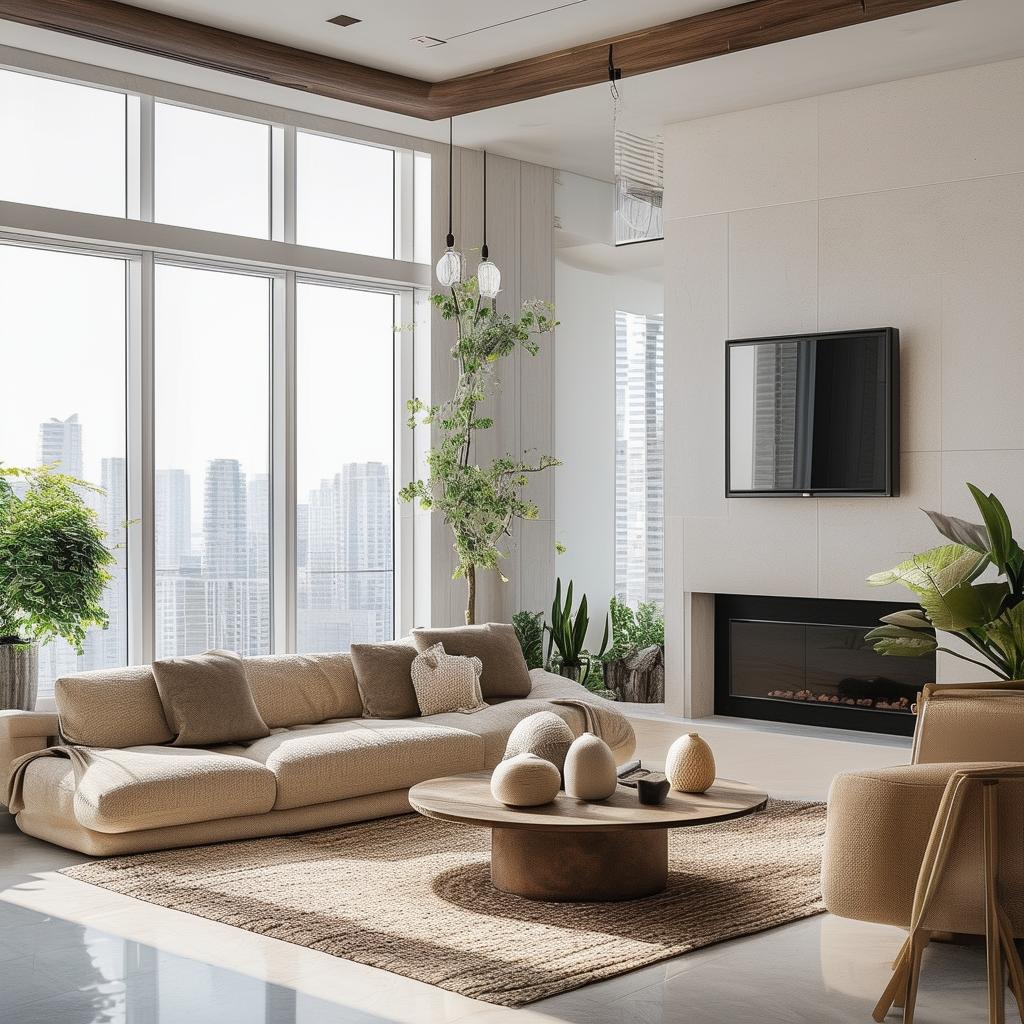
When it comes to small living rooms, utilizing vertical space can dramatically transform the aesthetic and functionality of the area. Consider incorporating tall bookshelves that not only provide storage but can also act as a striking design element. Go for floating shelves to display your favorite decor pieces, plants, or books, allowing the eye to be drawn upward and creating an illusion of more space. Additionally, wall-mounted organizers for keys or mail can keep surfaces clutter-free while adding a decorative touch.
Another approach is to use over-the-door racks for extra storage without occupying floor space. You can hang items like bags, hats, or umbrellas, which adds to organization without sacrificing style. If you’re seeking a blend of beauty and practicality, opt for vertical garden installations using wall-mounted planters. This not only breathes life into your living room but also engages the senses. To further enhance this approach, consider a murphy bed or foldable furniture that can be tucked away when not in use, providing flexibility without compromising comfort.
Color Schemes That Create an Illusion of Space in Your Living Room
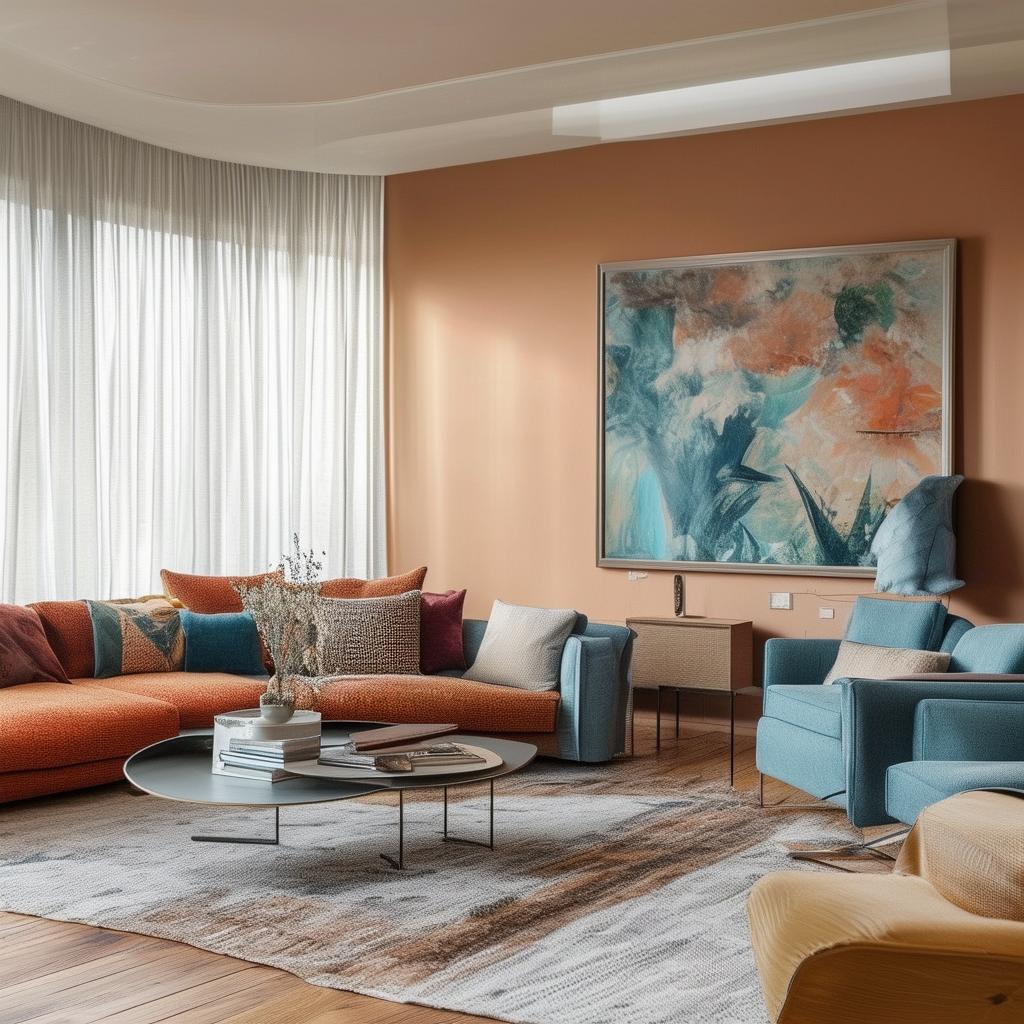
Using color strategically in your living room can dramatically alter its perception of space. Light colors, such as pale blues, soft greens, or buttery yellows, can reflect light and create an airy atmosphere, making the room feel larger than it is. For added dimension, consider combining light shades with deep accent colors on one feature wall. This creates a visual anchor while maintaining an expansive feel throughout the rest of the room.
Introducing a gradient of hues can also work wonders for creating depth. A technique known as ombre, where colors gradually transition from light to dark, can be applied to walls or decor elements, providing an illusion of height. Additionally, incorporating neutral shades in large furniture pieces while adding pops of color through accessories will prevent the space from feeling overwhelmed while still providing visual interest. Here are some combinations to consider:
- Warm Neutrals: Beige, soft whites, and terracotta
- Cool Tones: Light gray, sky blue, and mint green
- Contrasting Deep Accents: Navy, charcoal, or forest green
Light and Bright: Lighting Tips for a Cozy Living Room

Creating a cozy atmosphere in a small living room hinges significantly on the use of lighting. Incorporate a mix of soft, ambient light sources to bring warmth to your space. Consider using floor lamps or table lamps with warm-toned bulbs to cast a gentle glow, making the room feel inviting without overwhelming it. Wall sconces can also save precious floor space while adding a stylish touch. For accent lighting, try using string lights or LED strips around shelves or artwork, which can create a magical ambiance and draw attention to personal touches in your decor.
Another nifty trick is to layer your lighting for versatility during different times of the day or activities. Utilize a combination of task lighting, such as a reading lamp next to your favorite chair, and overhead fixtures that provide general illumination. Remember to position your light sources in a way that minimizes harsh shadows and maximizes softness. A well-considered lighting layout can open up your small living room, making it feel more spacious while maintaining a sense of warmth and intimacy. Using dimmers is an excellent solution for adjusting the mood on demand, helping you easily transition from bright and energetic to soft and cozy.
Decluttering Strategies for a Serene Living Room Atmosphere

Creating a peaceful sanctuary in your living room begins with thoughtful decluttering. Start by evaluating each item and ask yourself if it serves a purpose or brings you joy. This mindset can be liberating and allows you to part ways with unnecessary clutter. Consider implementing these simple strategies to help streamline your space:
- Adopt the one in, one out rule: For every new item you bring in, send one out.
- Utilize multifunctional furniture: Choose pieces that offer storage, like ottomans or coffee tables with internal compartments.
- Visible storage solutions: Use decorative baskets or stylish boxes to contain like items while still showcasing your décor.
After decluttering, the next step is to arrange your furniture thoughtfully to enhance the sense of space. Position your seating to create a natural flow and avoid overcrowding. Here’s a quick overview of furniture arrangement tips that can elevate your living room’s atmosphere:
| Arrangement Type | Benefits |
|---|---|
| Symmetrical Layout | Promotes balance and tranquility. |
| Zoned Seating | Creates intimate areas for conversation. |
| Off-Centered Design | Encourages a dynamic flow and enhances functionality. |
Creating Focal Points in Your Living Room Design
Creating a focal point in a small living room can transform the space from ordinary to extraordinary. One effective way to achieve this is by utilizing bold pieces of furniture or artwork that draw the eye. Consider selecting a statement piece, such as a vibrant sofa or an oversized piece of art, that contrasts with the surrounding decor. This not only anchors the room but also creates a sense of purpose. You can also use lighting elements, such as pendant fixtures or floor lamps, to cast light on these focal points, dramatically enhancing their presence in a constrained space.

Another strategy is to arrange furniture to promote a natural flow around your focal point. By positioning seating around the focal area, you invite conversation and engagement, making the room feel more intimate and inviting. Incorporate shelves or storage solutions that complement the focal point rather than detract from it. For example, a sleek bookcase can serve as a platform for decorative items, adding visual interest without overwhelming the space. To illustrate effective arrangements, see the table below for a few ideas on creating focal points while maximizing space:
| Element | Focal Point Idea | Space-Saving Tip |
|---|---|---|
| Sofa | Brightly colored sectional | Use smaller side tables that tuck away |
| Artwork | Large statement canvas | Hang on the wall to save floor space |
| Lighting | Eye-catching pendant light | Choose multi-functional fixtures |
Incorporating Mirrors to Enhance Your Living Room Space
Mirrors are not just functional items; they can be powerful design tools that reflect light and create the illusion of space. When positioned strategically, they can make your living room feel larger, brighter, and more inviting. Consider placing a large mirror opposite a window to amplify natural light or using a series of smaller mirrors artfully arranged on a wall to create a stunning focal point. Experiment with different shapes and styles, such as sleek modern frames or ornate vintage designs, to complement your décor while also enhancing spatial perception.
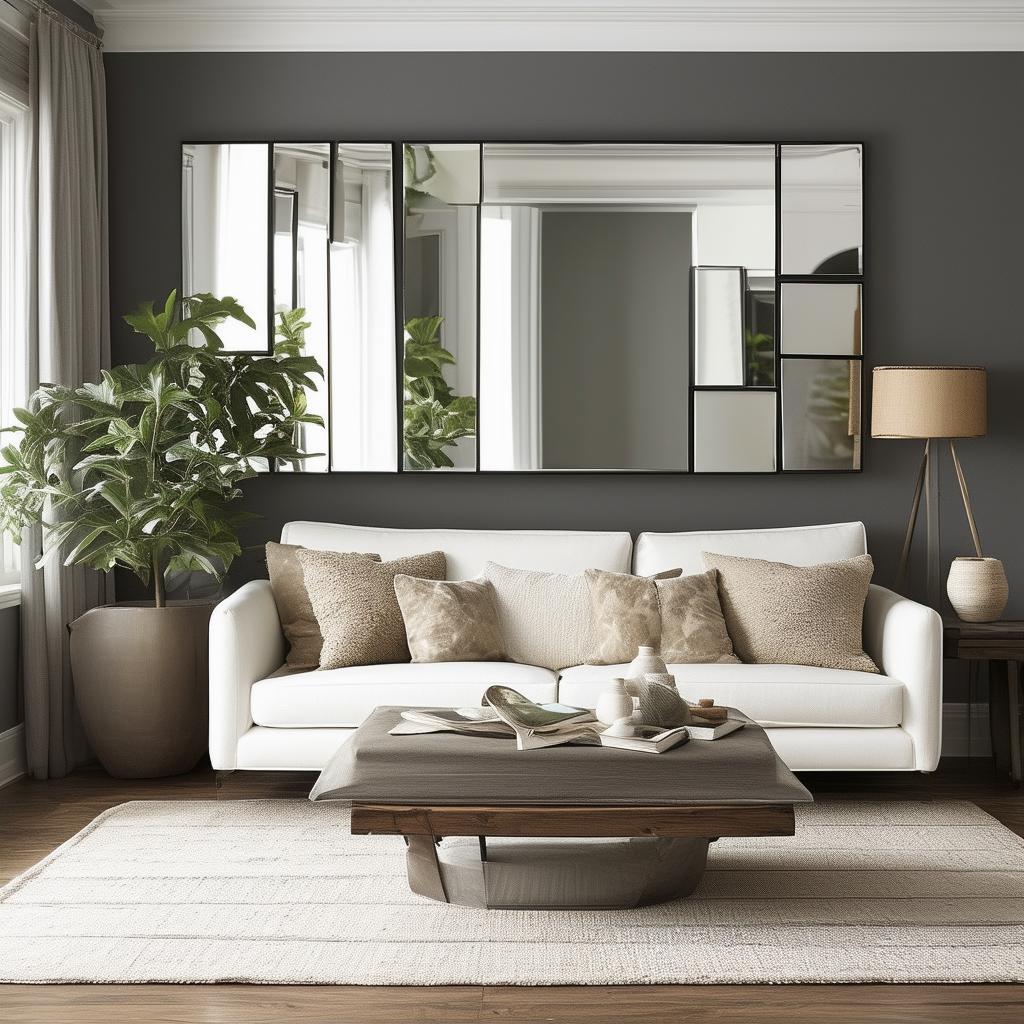
Additionally, mirrors can serve as a practical décor element by adding depth to your space. They can be incorporated in various ways, such as:
- Accent Walls: Create an eye-catching mirror gallery.
- Furniture Integration: Use mirrored furniture, like coffee tables or side tables, to reflect surroundings.
- Layering: Hang a mirror at varying heights to add dimension to your room.
By thoughtfully incorporating mirrors into your living room design, you can elevate the aesthetic while simultaneously maximizing the functionality, ensuring your space is both stylish and spacious.
The Power of Area Rugs in Defining Your Living Room
Area rugs serve as more than just decorative pieces; they play a crucial role in establishing the atmosphere of your living room. By strategically selecting a rug that complements your furniture and color palette, you can create a cohesive look that unites the various elements of your space. Consider the size: a larger rug can make a small living room feel more expansive, while a smaller rug can help define specific seating areas. When choosing a pattern, think about how it speaks to the overall theme of your room—whether it’s bohemian, modern, or traditional.
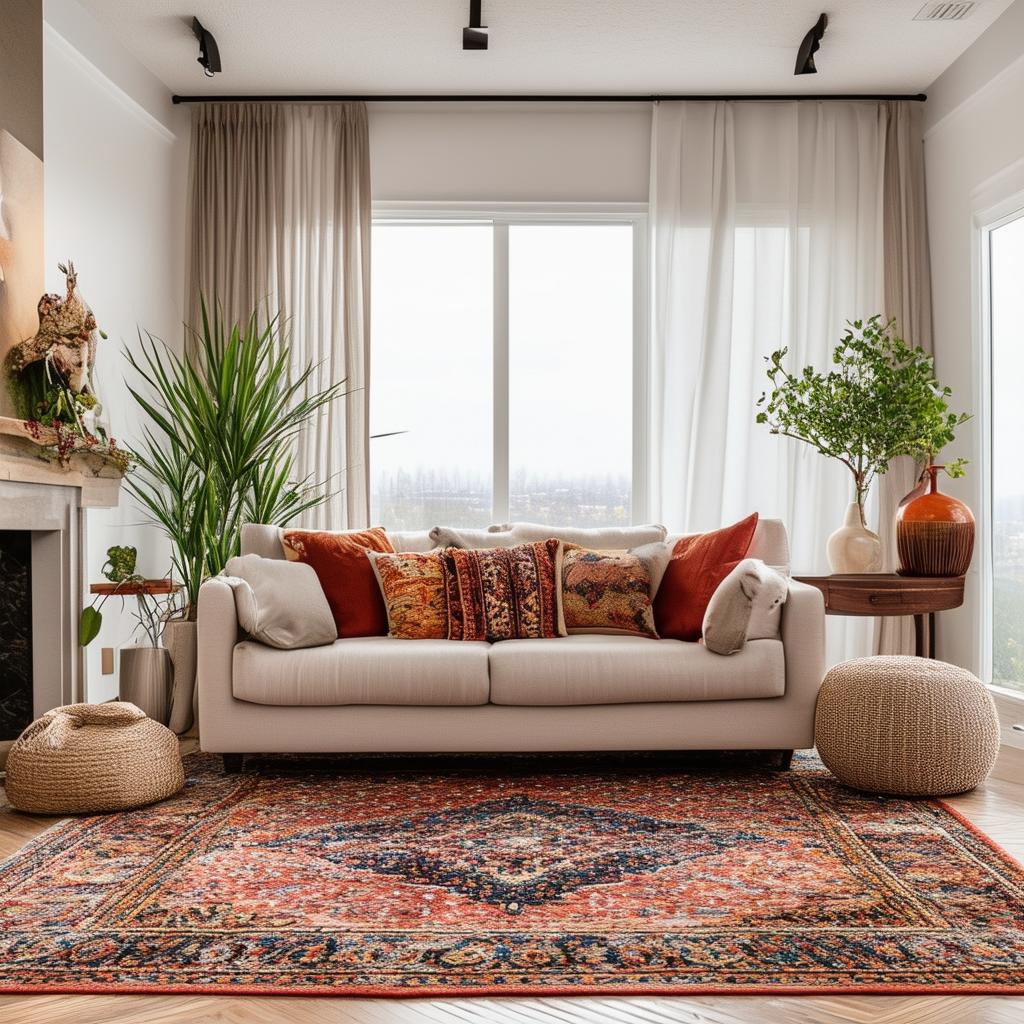
Additionally, layering rugs can add depth and dimension, giving your small living room a more spacious and inviting feel. Experiment with textures: combining a plush area rug with a flat-weave rug can create visual interest without overwhelming the space. For a more tailored approach, consider using a color scheme that draws the eye, while still allowing the room to function seamlessly. Here’s a simple guideline to follow when selecting an area rug:
| Rug Size | Impact on Room |
|---|---|
| Small (2×3 ft) | Great for accent areas or entryways. |
| Medium (5×8 ft) | Defines seating areas without overwhelming. |
| Large (8×10 ft or larger) | Creates a unified look, enhances coziness. |
Plants and Greenery: Adding Life to Your Living Room
Incorporating plants into your living space not only enhances aesthetic appeal, but also contributes to a refreshing atmosphere that encourages relaxation and well-being. Vertical gardens or hanging planters are perfect solutions for small living rooms, as they utilize wall space creatively while avoiding clutter on the floor. Consider these options to flaunt your green thumb:
- Wall-mounted planters: These allow you to display a variety of plants without sacrificing precious floor space.
- Floating shelves: Install these to host smaller pots and combine them with books or decorative items for an eye-catching arrangement.
- Suspended pots: Use macramé hangers or modern hooks to add greenery at different heights, creating an interesting focal point.
Additionally, compact plants can bring vibrancy without dominating the room. Opt for low-maintenance succulents, or choose a small indoor tree to add drama without overwhelming the area. To help in your selection, here’s a quick reference table showcasing suitable plant options:
| Plant Type | Size | Light Requirement |
|---|---|---|
| Snake Plant | 1-3 feet | Low to bright indirect light |
| Pothos | Varies | Low to bright indirect light |
| ZZ Plant | 1-3 feet | Low light |
Stylish and Space-Saving Storage Solutions for Your Living Room
Transforming your living room into a chic and organized oasis doesn’t have to be a daunting task. Start by investing in multi-functional furniture that offers both style and utility. For instance, a sleek coffee table with built-in storage compartments can serve as a perfect spot for books and magazines while maintaining a polished look. Consider versatile ottomans that double as seating and storage space for throws or board games. Wall-mounted shelves can be an excellent choice for displaying decorative items while cleverly utilizing vertical space, enhancing the room’s overall aesthetic.
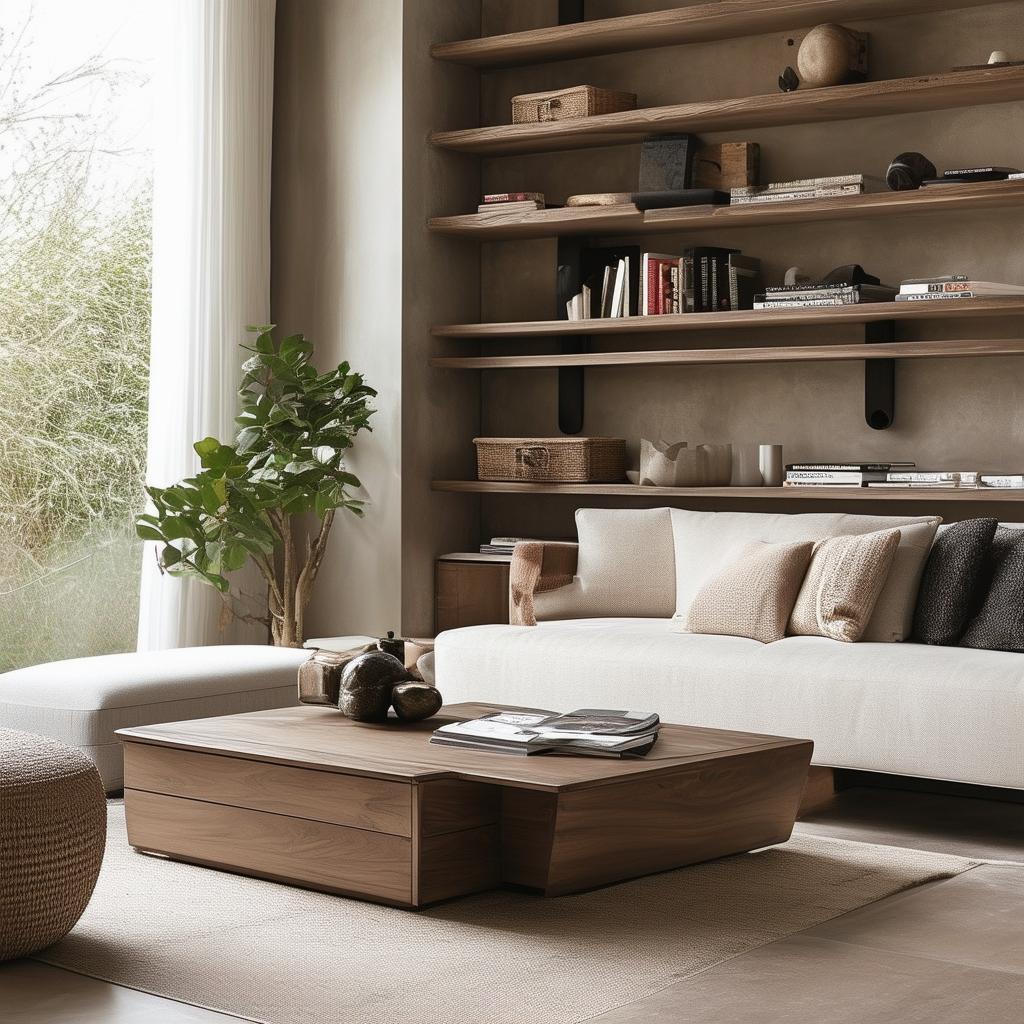
Incorporating decorative baskets or chic storage boxes can also help keep clutter at bay while enriching your living room’s decor. These can be placed under side tables or on shelves, adding texture and a pop of color to the space. Additionally, explore the potential of sliding cabinets that can be tucked away when not in use, offering a streamlined appearance without compromising on functionality. By blending your storage solutions with your decor, you can create an environment that feels both stylish and inviting.
Choosing the Right Scale for Furniture in a Small Living Room
Finding the perfect size of furniture for a small living room is essential to create a harmonious and functional space. Consider selecting scaled-down pieces that fit seamlessly within your layout. For example, opt for a loveseat instead of a full-sized sofa; this can free up floor space while still providing adequate seating. Additionally, look for multi-functional furniture, such as a coffee table that doubles as storage, or ottomans that can serve as both seating and a place to rest your feet. Choosing light-colored fabrics can further enhance the feeling of openness in a compact area.
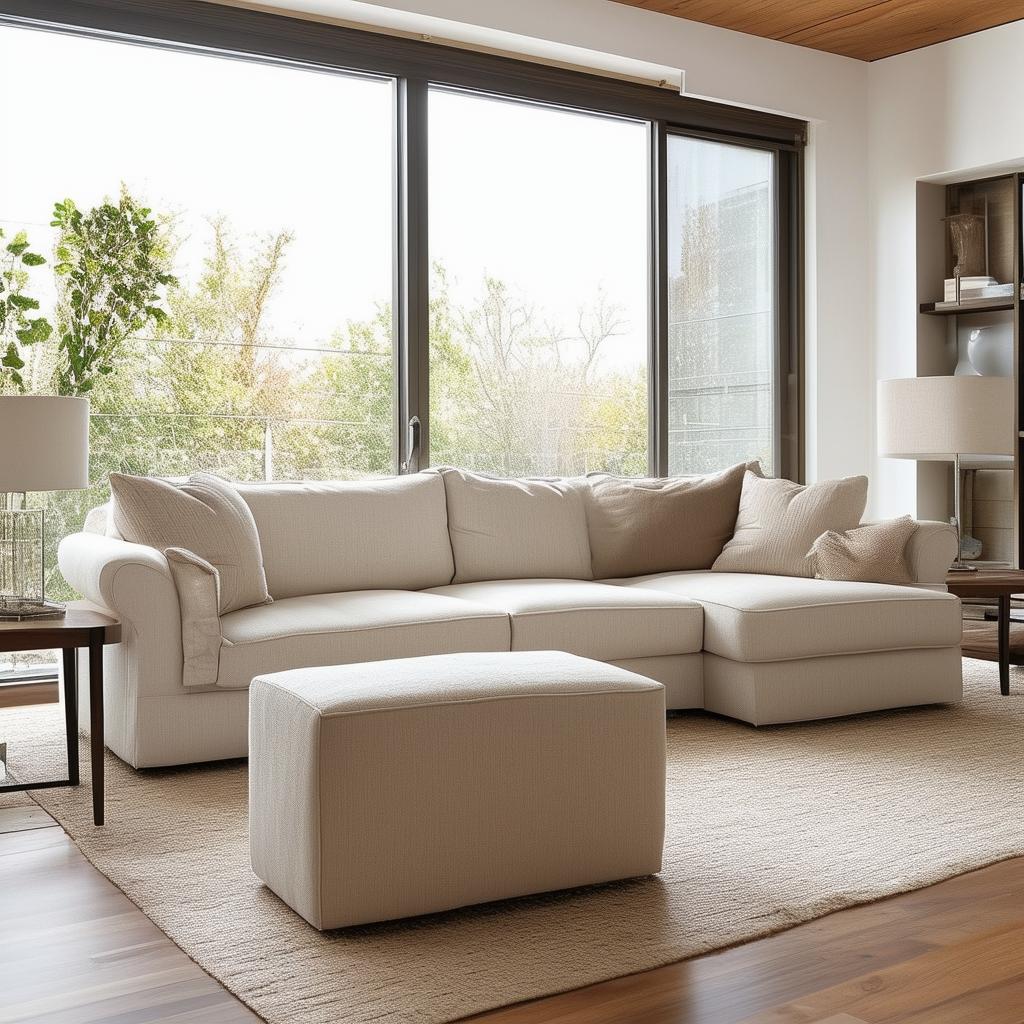
Moreover, be mindful of the visual weight of the furniture. Incorporating pieces with legs or a transparent design can create a sense of airiness. Instead of bulky chairs, consider slim-profile seating options that maintain comfort without overwhelming the room. Here are some tips to keep in mind:
- Use floating shelves to draw the eye upwards.
- Incorporate mirrors to reflect light and create a sense of depth.
- Choose pillow sizes that complement the scale of your seating.
Innovative Layout Ideas to Maximize Your Living Room
To make the most out of your living room, consider integrating flexible furniture arrangements that can adapt to your daily needs. Utilize modular sofas that can be rearranged to create more open space or to accommodate guests. Additionally, incorporating a round coffee table can create a more fluid movement within the room compared to traditional rectangular designs. Emphasize vertical space by adding built-in shelves that draw the eye upward, making the area feel larger and more open.

Another clever strategy is to use furniture with dual purposes. Look for pieces like ottomans with storage or side tables that double as seating. A compact section with a pull-out bed can transform your living room into a guest-friendly space. Don’t forget to add mirrors to reflect light and enlarge the perceived space. A combination of these elements will help you achieve a harmonious balance between functionality and style in your living area.
Textiles and Patterns That Open Up Your Living Room
In the quest to elevate your living room’s aesthetic while optimizing space, textiles and patterns play a pivotal role. Rich fabrics can introduce warmth and personality, transforming a simple room into an inviting sanctuary. Consider using bold geometric prints for throw pillows or subtle textures in your curtains to create layers that draw the eye. Mixing different patterns can also add dynamic charm, as long as there’s a careful balance between chaos and cohesion. Choose a color palette that resonates with your overall decor, allowing soft pastels to coexist harmoniously with vibrant hues for a balanced look.
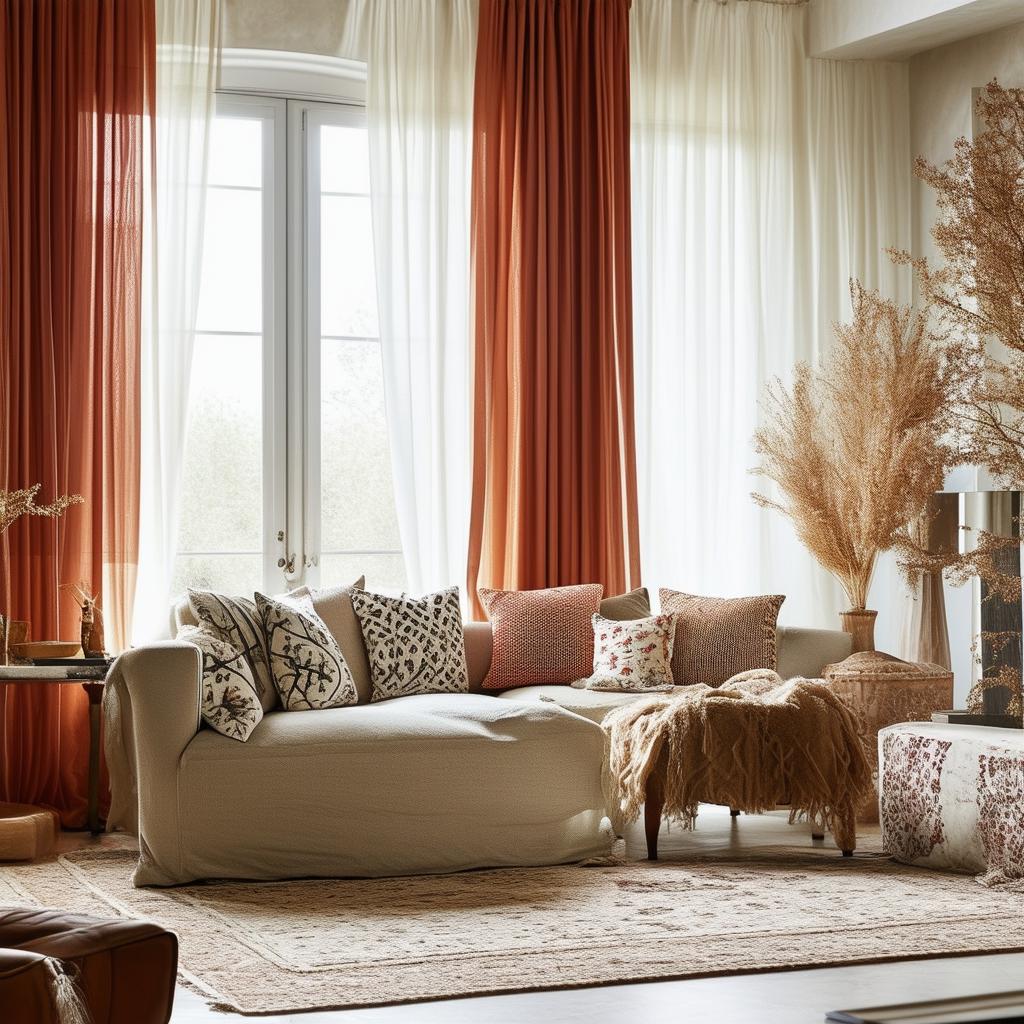
To further enhance your living room’s style, incorporate area rugs that serve both functionality and beauty. Delicate patterns can help define zones, making the space feel larger while adding visual interest. Opt for lightweight materials that are easy to clean, especially in smaller spaces. Additionally, consider using textiles with natural motifs—like floral or forest designs—to instill a sense of calm. To help visualize these ideas, refer to the table below for a quick comparison of textile types and their attributes:
| Textile Type | Pattern Style | Best Use |
|---|---|---|
| Velvet | Solid or Subtle | Cushions, Throws |
| Linen | Textured | Curtains, Upholstered Furniture |
| Wool | Geometric | Area Rugs |
| Cotton | Floral/Abstract | Pillows, Blankets |
Smart Technology Solutions for a Modern Living Room
Integrating smart technology into your living room can enhance both aesthetics and functionality. Consider investing in multi-functional furniture that seamlessly blends tech with style. For instance, a sleek coffee table with built-in wireless charging or a smart sofa that features embedded speakers can transform your space into a hub of modern convenience. Additionally, don’t overlook the impact of smart lighting; using adjustable LED strips or smart bulbs allows you to set the perfect atmosphere for any occasion, ensuring your living room is both welcoming and stylish.
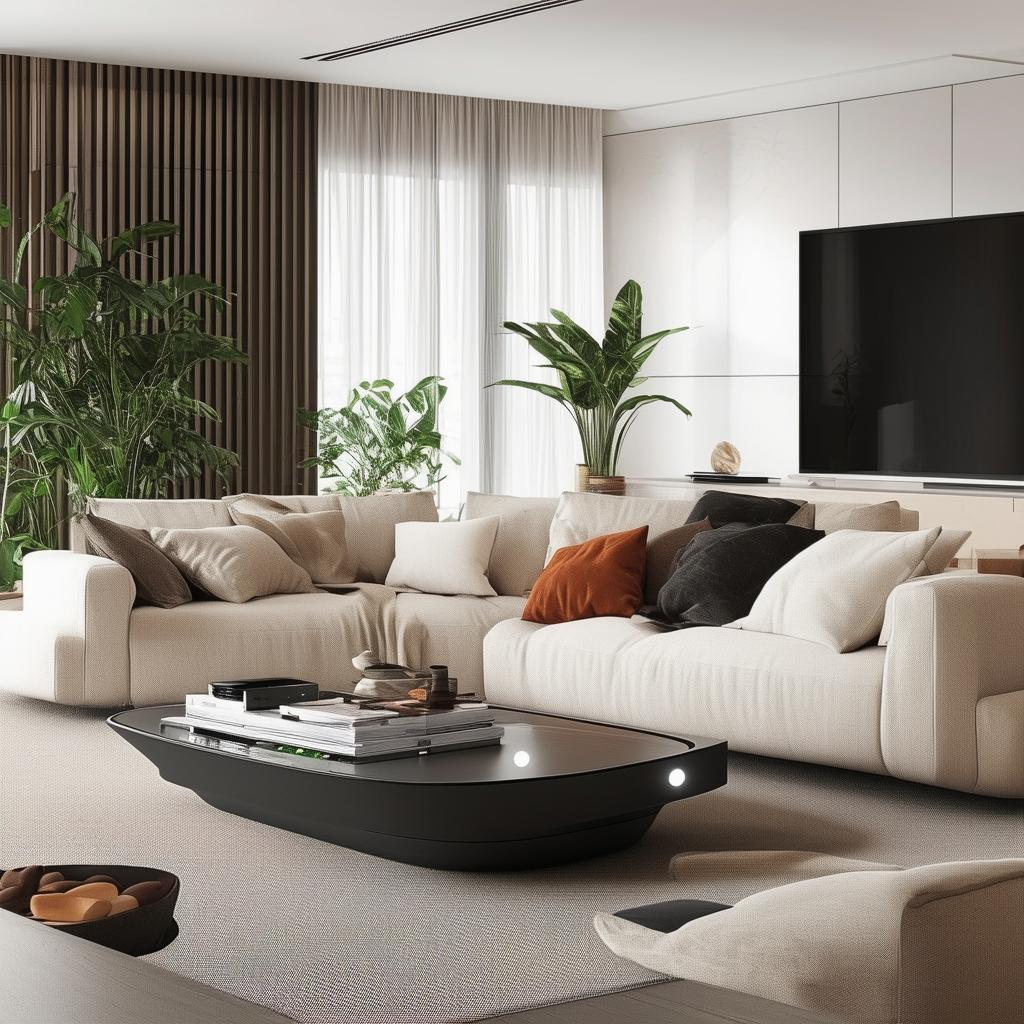
Another innovative solution is to utilize smart home devices designed to maximize your living area. Products like smart speakers or display screens can be wall-mounted, keeping surfaces clutter-free while providing entertainment and connectivity. Opt for a minimalist design with built-in shelves that house not only books but also technological gadgets, enabling a tidy yet sophisticated look. Take a look at the comparison of various smart devices that can seamlessly fit into your modern living room:
| Device | Functionality | Space Efficiency |
|---|---|---|
| Smart Coffee Table | Wireless Charging, Bluetooth Speakers | Compact Design |
| Smart Light Strips | Adjustable Colors & Brightness | Wall-mounted, Out of Sight |
| Wall-mounted Smart Display | Streaming, Home Control | Free Floor Space |
Art and Decor That Reflect Your Style in a Small Living Room
Transforming your small living room into a stylish haven requires a careful selection of art and decor that resonate with your personal style while maximizing the space. Consider incorporating multi-functional artwork that not only serves as a visual delight but also offers practicality. A striking gallery wall can become a focal point; mix and match framed prints, family photos, and even fabric art to create depth and interest without consuming floor space. Using light colors or reflective materials can also open up the space, making it feel larger than it is.

When it comes to decor, opt for scaled-down accessories that won’t overwhelm your space. Look for options that infuse color and personality without cluttering surfaces. Here are some creative ideas to consider:
- Floating shelves: These provide display space for plants, books, and decorative items.
- Mirrors: Strategically placed mirrors can enhance light and give the illusion of depth.
- Compact furniture: Pieces with built-in storage can reduce clutter while offering style.
- Statement lighting: A stylish lamp or pendant can act as both a practical feature and a design highlight.
Below is a simple table that outlines various decor styles and their characteristics, ideal for a small living room:
| Decor Style | Key Features | Color Palette |
|---|---|---|
| Minimalist | Clean lines, functional furniture | Neutral tones, monochrome |
| Bohemian | Layered textiles, eclectic decor | Vibrant colors, earthy tones |
| Mid-Century Modern | Bold shapes, natural woods | Warm colors, muted pastels |
By selecting art and decor that align with your aesthetic without compromising the functionality of your small living room, you can create an inviting and stylish retreat that truly feels like home.
Ideas for Window Treatments that Make Your Living Room Shine
To enhance the aesthetic appeal of your small living room, consider window treatments that not only beautify the space but also maximize natural light. Sheer curtains are an excellent choice, offering an airy feel while allowing sunlight to filter in gently. Pair them with decorative curtain rods or unique hardware to add an element of character. For a modern twist, explore roller shades in bold colors or patterns that can be easily retracted when you want an unobstructed view. They save space and create a sleek silhouette, contributing to an uncluttered appearance.
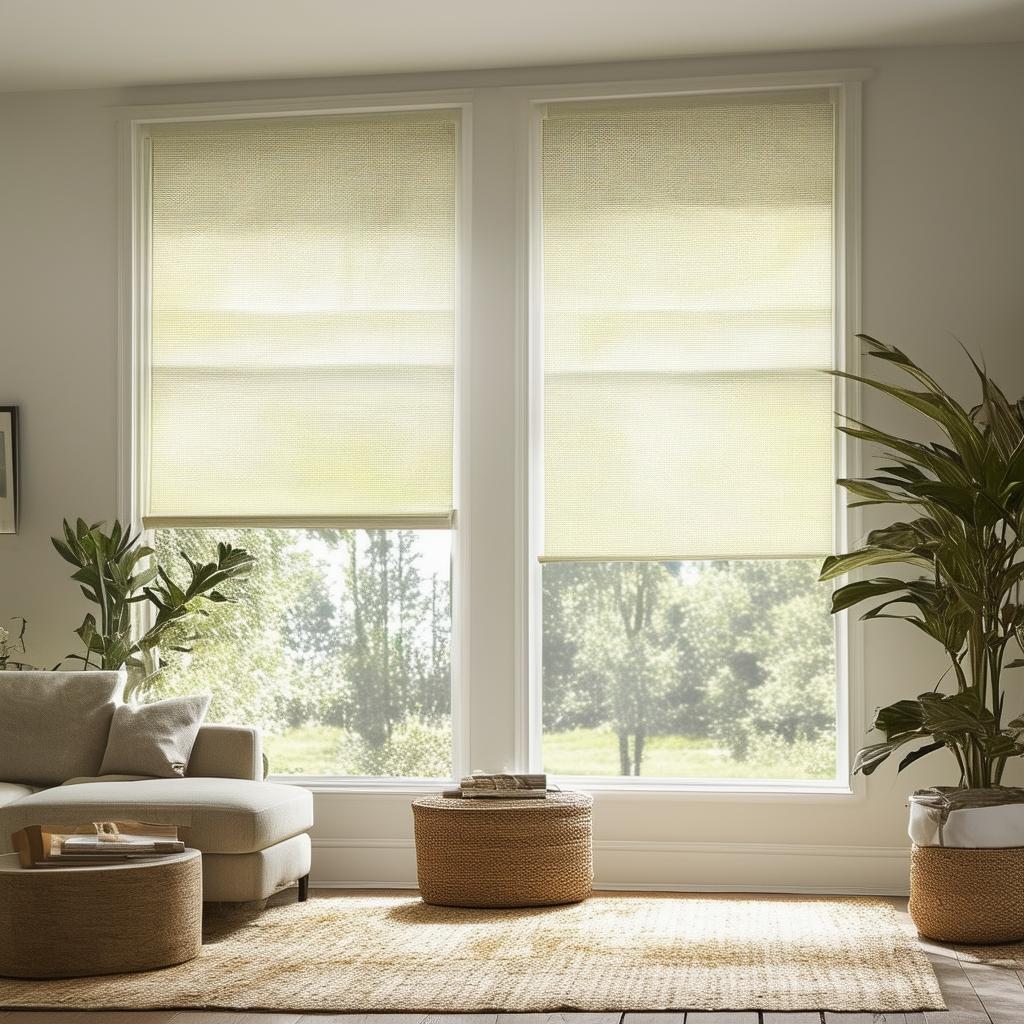
Additionally, incorporating layered treatments can provide depth and texture to your windows. Combine lightweight sheers with heavier drapes for a versatile look that can adapt to different moods throughout the day. Consider using window film as an alternative; it offers privacy without sacrificing light while enhancing aesthetics with beautiful designs. To keep things organized, utilize cordless options or motorized treatments that minimize visual clutter and allow for easy operation in confined spaces.
Utilizing Corners: Functional Furniture for Your Living Room
Transforming corners into functional areas of your living room can enhance both the style and utility of your space. By incorporating corner furniture, you can create cozy nooks that invite relaxation and provide extra storage. Consider using a corner sofa, which not only saves space but also offers ample seating for guests. A corner bookshelf can serve as a stylish display for your favorite books and decor, while also maximizing vertical space. Other options include:

- Corner desks for a home office setup
- Lazy Susans that add a unique touch and provide access to items stored in deeper cabinets
- Plant stands that utilize corner spaces to bring in greenery
For a more organized approach, consider investing in multi-functional pieces that cater to your needs. A clever solution is a corner storage ottoman, which can serve as both seating and a place to stow away blankets or games. Alternatively, a corner entertainment unit can elegantly hold your TV and media accessories while making smart use of an otherwise overlooked area. Below is a quick comparison of options:
| Furniture Type | Functionality | Style Impact |
|---|---|---|
| Corner Sofa | Seating & Space-Saving | Inviting & Comfortable |
| Corner Bookshelf | Storage & Display | Stylish & Organized |
| Corner Desk | Work Space | Functional & Efficient |
| Storage Ottoman | Seating & Storage | Versatile & Chic |
Seasonal Decor Tips for a Fresh Living Room Makeover
Bringing the essence of each season into your living room can invigorate the space and create a vibrant atmosphere. Consider integrating natural elements by adding potted plants in varying sizes; this not only enhances the aesthetic but also helps purify the air. Additionally, incorporate seasonal textiles like lightweight throws or textured cushions in warm autumn tones or cool winter hues to instantly refresh the room. For a touch of whimsy, use scented candles or diffusers featuring seasonal fragrances like pumpkin spice or pine—these subtle scents can evoke emotions tied to the time of year.

To embrace the spirit of the seasons without overwhelming your small living room, utilize modular decor that can be easily stored away or rotated. Hang a small, decorative wall shelf to display seasonal knick-knacks such as seasonal artwork or thematic figurines, ensuring each item has a place. Utilize floating shelves to maintain a minimalist look while maximizing vertical space. A carefully curated gallery wall featuring seasonal pieces can also create a focal point without cluttering the room. Remember, the goal is to generate a changing but cohesive style, making the most out of your small area.
Setting the Mood: Choosing the Right Accents for Your Living Room
When it comes to transforming your small living room into a cozy haven, the right accents can work wonders. Textiles such as throw pillows, blankets, and area rugs can add warmth and dimension without overwhelming the space. Consider using light colors or bold patterns to create a focal point, while still maintaining a sense of openness. Decorative elements like wall art and mirrors can enhance vertical space and create depth. Opt for pieces that reflect your personality, yet are versatile enough to ensure your living room evolves with your style.

Incorporating multi-functional furniture is another clever way to maximize style while optimizing space. Look for items like ottomans with hidden storage, slim-profile coffee tables, or side tables that can double as seating. For instance, a sleek console table can serve as both a display for your favorite decor and a functional workspace when needed. Additionally, think about layering lighting with a mix of table lamps, floor lamps, and wall sconces to create an inviting atmosphere. Here’s a quick comparison of accent options:
| Accent Type | Benefits |
|---|---|
| Textiles | Adds comfort and warmth |
| Wall Art | Creates focal points and personality |
| Mirrors | Enhances light and depth |
| Multi-functional Furniture | Maximizes functionality |
| Layered Lighting | Sets the mood and adds dimension |
Family-Friendly Solutions for a Small Living Room
Creating a family-friendly atmosphere in a small living room requires a blend of functionality and style. Start by incorporating multi-purpose furniture that caters to both adults and children. Consider a storage ottoman that serves as a footrest while providing ample space to stash toys or blankets out of sight. Also, look for a foldable coffee table that can expand during family game nights and be easily tucked away when not in use. This approach not only maximizes the available space but also helps maintain a tidy environment.

Another effective strategy involves choosing the right colors and materials to ensure durability and comfort. Opt for washable fabrics on sofas and cushions, making cleanup after spills or accidents a breeze. Light tones can make the space feel larger, while vibrant accents in rugs or artwork can add a playful touch. To further enhance the comfort and safety of the area, think about incorporating a small, soft area rug that can cushion falls during playtime. Explore the following essential items for a cozy yet practical living room setup:
- Multi-purpose furniture (e.g., sofa beds, nested tables)
- Storage solutions (cabinets, bookshelves with baskets)
- Washable upholstery (removeable covers, treated fabrics)
- Lighting (adjustable floor lamps, soft LED lighting)
Creating Zones in Your Living Room for Different Activities
To create distinct zones within your living room, start by identifying the primary activities you want to accommodate. Whether it’s reading, entertaining, or simply relaxing, organizing your space around specific functions can elevate both style and functionality. Consider using area rugs to define each zone visually; a plush rug under your coffee table can delineate the seating area while a smaller rug near a bookcase denotes a cozy reading nook. Invest in modular furniture that can be easily rearranged, allowing for flexibility when hosting guests or adapting the space for your daily routines.

Another effective strategy is to utilize smart storage solutions to keep your zones organized. Incorporate multi-functional furniture, such as a coffee table with hidden compartments or an ottoman that doubles as a storage unit. Vertical space is your ally; install shelves above eye level to store books and decor, freeing up floorspace below. Here are a few more ideas to consider:
- Use lighting: Differentiate zones with various types of lighting, like floor lamps for relaxation and pendant lights for dining.
- Add dividers: Decorative screens or plants can offer a subtle boundary between zones without creating a cramped feeling.
- Color code: Use varying color schemes in decor or artwork to create a visual distinction.
Sustainable Choices for a Stylish Living Room Upgrade
Elevating your living room’s aesthetic doesn’t have to come at the cost of the environment. By embracing thoughtful, eco-friendly choices, you can create a chic space that reflects your style while promoting sustainability. Consider incorporating upcycled furniture that tells a story—pieces that have been reimagined with a fresh coat of paint or new upholstery can add character without compromising on quality. Additionally, choose sustainable materials like bamboo or reclaimed wood for your furniture, which not only have lower environmental impacts but also provide a timeless appeal.

Integrating biophilic design elements can further enhance your living room’s charm while fostering a connection to nature. Opt for houseplants that are easy to maintain, which purify the air and boost your mood. For an artistic touch, display them in biodegradable pots or stylish hanging planters. Furthermore, selecting energy-efficient lighting options, such as LED fixtures or solar-powered lamps, will illuminate your space beautifully while lowering energy consumption. A careful mix of these sustainable choices ensures your space is both stylish and environmentally conscious.
Personalizing Your Living Room While Keeping it Functional
Creating a distinctive living room that reflects your personal style while maintaining functionality is an artful balancing act. To achieve this, consider incorporating multi-functional furniture that serves dual purposes, such as a stylish coffee table with hidden storage or a chic ottoman that can double as extra seating. Wall-mounted shelves not only display your favorite decorative items but also free up floor space, enhancing the room’s overall functionality. Ensure to choose a cohesive color palette that resonates with your taste while remaining versatile enough to adapt to different furniture arrangements in the future.

Another effective strategy is to utilize textiles to inject personality without cluttering the space. Layering rugs, throw blankets, and decorative pillows introduces texture and warmth, inviting comfort into the room. To keep things organized yet personalized, consider using a display cabinet that combines glass doors and open shelving, allowing you to exhibit cherished items while keeping the living area tidy. By blending unique decor elements with practical solutions, you can create an inviting atmosphere that is both stylish and efficient.
Q&A

Q1: Why is it important to maximize space in a small living room?
A1: Maximizing space in a small living room is essential for creating a comfortable and functional environment. A well-organized area can enhance your daily living, improve the room’s flow, and provide room for creativity in your decor. When space is limited, every inch counts, and smart design choices can result in an inviting atmosphere that feels both spacious and stylish.
Q2: What are some fundamental principles for designing a small living room?
A2: Fundamental principles include prioritizing functionality, selecting appropriately sized furniture, and using colors and lighting wisely. Opt for multi-purpose furniture, such as ottomans with storage or convertible sofas, to enhance utility without compromising style. Additionally, light colors can make a space feel larger, while mirrors can give the illusion of depth.
Q3: Can you share some creative furniture ideas that save space?
A3: Absolutely! Consider a wall-mounted desk that can be folded away when not in use or a coffee table with hidden compartments. Modular furniture pieces that can be rearranged for different occasions are also a fabulous choice. Lastly, look for seating options that can tuck away neatly under a table or that serve dual purposes, like a bench that offers storage.
Q4: How can I incorporate storage solutions into my small living room?
A4: There are many innovative ways to introduce storage without cluttering your living room. Utilize vertical space by installing shelves or cabinets that reach the ceiling. Use under-sofa storage boxes or baskets, and consider furniture with built-in shelving. Floating shelves can also display decor while providing space for books and personal items.
Q5: What role does lighting play in a small living room design?
A5: Lighting is crucial in small living rooms as it can dramatically affect the ambiance and perceived size of the space. Natural light should be maximized through translucent window treatments, and layered artificial lighting can illuminate dark corners, creating a cozy feel. Pendant lights and wall sconces can save floor space while adding style.
Q6: How can I personalize my small living room without overwhelming the space?
A6: To personalize your space, focus on a few key decor pieces that reflect your style. Art prints, throw pillows, or a unique rug can add character without overwhelming the room. Sticking to a cohesive color palette will help maintain a balanced look. Remember, less can often be more in small spaces—choose meaningful pieces that resonate with you.
Q7: Are there any common mistakes to avoid when designing a small living room?
A7: Yes, common mistakes include overcrowding the space with large furniture or too many decorative items. Additionally, neglecting to consider the scale of furniture relative to the room can make it feel cramped. It’s also easy to fall into the trap of dark colors, which can make a small room feel even smaller. Keeping it light and airy is key!
Q8: How can plants be utilized in a small living room?
A8: Plants can add vibrancy and warmth to a small living room without taking up significant space. Consider vertical planters, hanging pots, or wall-mounted plant shelves to incorporate greenery without sacrificing floor area. Small potted plants or succulents can also add a touch of nature to tabletop spaces and corner areas.
Q9: What are some simple DIY ideas for small living room decor?
A9: DIY projects can be a fun way to personalize your space while saving money. Try creating a gallery wall with a collection of your favorite photos or prints, or upcycle old furniture with fresh paint. You could also build a simple wooden shelf or a pegboard for keys, plants, or lightweight decor, keeping your style unique and functional.
Q10: Where can I find inspiration for designing my small living room?
A10: Inspiration can be found everywhere! Explore online platforms like Pinterest and Instagram, where many interior designers share their creative ideas. Home decor magazines and design blogs can provide helpful tips and visuals. Local home decor stores may also showcase stylish arrangements that can spark your creativity while you shop.

Insights and Conclusions
transforming a small living room into a stylish and functional haven is entirely achievable with the right mindset and a sprinkle of creativity. By embracing space-saving furniture, clever storage solutions, and innovative designs, you can maximize every inch while showcasing your unique aesthetic. Remember, small does not mean limited; it invites an opportunity to curate a space that is both personal and practical. As you embark on your journey to optimize your living area, let your imagination lead the way—after all, the heart of a home is where creativity meets comfort. Here’s to redefining your small space into a big statement!
As an Amazon Associate I earn from qualifying purchases.
 decorafit.com Design ideas for your home and patio
decorafit.com Design ideas for your home and patio
